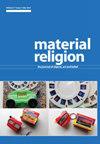“How Dare Men Mix up the Bible so with Their Own Bad Passions”: When the Good Book Became the Bad Book in the American Civil War
IF 0.4
3区 哲学
0 RELIGION
引用次数: 0
Abstract
Abstract This essay examines how the American Civil War (1861–1865) transformed the material nature of the Bible such that some copies did not operate in the ways Anglo-Americans expected them to work as the inspired words of God. According to U.S. law, Bibles shipped to the Confederate States were contraband: illegal objects that should be confiscated before reaching enemy hands. Classifying Bibles as contraband led to the widespread notion that Bibles assumed national identities in their work for God. Protestants marked and printed Bibles as war objects that worked specifically for (or against) the Confederate States or the United States. They deployed these Bibles against other Protestants as powerful weapons of God. According to some, Bibles of enemy Protestants operated as immoral books that threatened to undermine God, God’s people, and the military victory of God’s favored nation. Thus, Bibles realized multiple and, sometimes, competing material natures. Confederate and Union Protestants put Bibles to work as powerful objects that mediated God’s presence on earth, materialized debates over slavery, killed enemies, and stopped bullets. Some Bibles functioned simultaneously as God’s Word, commodities, contraband, weapons, shields, and talismans. Each side attempted to hinder the progress and agency of enemy Bibles by capturing volumes as prisoners of war, stealing copies as souvenirs, and destroying books as powerful enemy weapons. The harsh and violent realities of the Civil War initiated a crisis in the material nature of Bibles such that some copies of the Good Book transformed into the Bad Book.“男人怎么敢把圣经和他们自己的坏激情混在一起”:当美国内战中的好书变成了坏书
摘要本文探讨了美国内战(1861-1865)是如何改变《圣经》的物质性质的,以至于一些副本没有按照英美裔美国人所期望的方式作为上帝的启示文字来运作。根据美国法律,运往邦联的圣经是违禁品:在到达敌人手中之前应该没收的非法物品。将《圣经》归类为违禁品,导致人们普遍认为《圣经》在为上帝工作时具有民族身份。新教徒将圣经标记和印刷为专门为(或反对)邦联或美国工作的战争物品。他们将这些圣经作为上帝的强大武器来对付其他新教徒。根据一些人的说法,敌人新教徒的《圣经》是不道德的书籍,威胁要破坏上帝、上帝的子民以及上帝所爱的国家的军事胜利。因此,《圣经》实现了多重的,有时甚至是相互竞争的物质本质。邦联和联邦新教徒将《圣经》作为强有力的工具,调解上帝在地球上的存在,实现关于奴隶制的辩论,杀死敌人,阻止子弹。一些圣经同时充当上帝的话语、商品、违禁品、武器、盾牌和护身符。每一方都试图通过将圣经作为战俘捕获,将副本作为纪念品盗窃,并将书籍作为强大的敌人武器销毁,来阻碍敌人圣经的发展和代理。内战的残酷和暴力现实引发了《圣经》物质性质的危机,以至于一些善本变成了坏本。
本文章由计算机程序翻译,如有差异,请以英文原文为准。
求助全文
约1分钟内获得全文
求助全文

 求助内容:
求助内容: 应助结果提醒方式:
应助结果提醒方式:


